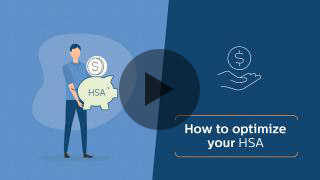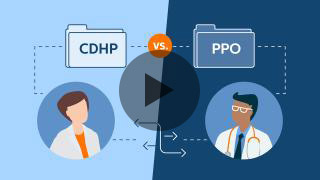HEALTH SAVINGS ACCOUNT
What is an HSA?
A Health Savings Account (HSA) is a special savings account you can use to pay for health care costs. You don’t pay federal income tax on the money you deposit, and when you use your HSA to pay for qualified medical expenses, you don’t pay tax on those withdrawals either. To open an HSA, you must be enrolled in a High-Deductible Health Plan (HDHP).
What is a High-Deductible Health Plan?
A High-Deductible Health Plan (HDHP) is a health insurance plan that has a lower monthly premium but a higher deductible. With an HDHP, you’ll see less money taken out of your paycheck, but you’ll pay more out of pocket when you need medical care—especially before your insurance coverage kicks in. Unlike a Preferred Provider Organization (PPO) plan, you generally won’t have flat copays for doctor visits or prescriptions; instead, you pay the full cost of care until you meet your deductible. However, an HDHP can be paired with an HSA, which allows you to set aside money for qualified medical expenses on a pre-tax basis.
Resource Documents
WHY HAVE AN HSA?
Like a traditional plan, your CDHP health insurance pays the providers directly once you have met your deductible.
It’s easy to use your debit card to pay your qualified expenses. It’s not just for doctor visits: Use your HSA to pay for;
- Eyeglasses
- Qualified prescriptions
- Hearing aids
- and more!
TRIPLE TAX-FREE
Tax-Free Deposits
Even if you don’t itemize deductions you don’t pay federal income tax on your contributions.
Tax-Free Savings
You keep any money you don’t spend and it grows tax-free.
No use-it-or-lose-it.
Tax-Free Withdrawals
There’s never tax on withdraws to pay for qualified expenses.
IT’S BETTER THAN AN FSA
Unlike an FSA, your savings grow from year to year. There’s no “use it or lose it” rule. It’s your money to keep. Your money will roll over automatically every year so you have savings for the future.
YOU CAN ALSO
INVEST IT
Once your balance reaches the required minimum you can begin investing in mutual funds. If you earn money on your investments, you don’t pay income tax on that money, either.
You can build a nest egg for retirement: After age 65, you may use your HSA savings to pay any expense and only pay regular income tax on your withdrawal.
Eligibility
Your employer is pleased to offer the HSA as a savings option when you elect the HSA-qualified CDHP Plan. However, the federal government regulates who is eligible for the account.
Please review these rules carefully.
- You must elect the HSA-qualified CDHP plan to qualify to open an HSA.
- You cannot be enrolled in Medicare. If you are enrolled in Medicare then you are not eligible to open an HSA. However, if you have already opened an HSA before you enrolled in Medicare then you are allowed to use the money in your HSA, but you are not allowed to contribute any more money to your HSA.
- You cannot be covered under Tricare, and cannot have received any health benefits from the Veterans Administration or one of their facilities, including prescription drugs, in the three months prior to opening your HSA.
- You must not have an FSA or be covered under any other medical insurance, such as a spouse’s plan, unless the other coverage is also a special HSA-qualified medical insurance plan.
- You must not be claimed as a dependent on another person’s tax return.
USE YOUR HSA WISELY
The money saved in your HSA is intended to be used for qualified medical expenses (as defined by the IRS) or saved for future qualified medical expenses. In order to avoid extra taxes and tax penalties, you should only use the money to pay for qualified medical expenses, unless you are over age 65.
The list of qualified medical expenses is extensive and includes vision and dental services. You can find a complete list in IRS Publication 502 available on the IRS website, www.IRS.gov.
IT’S A RETIREMENT ACCOUNT ONLY BETTER
After age 65 you can withdraw money from your HSA even for non-qualified expenses. The money you withdraw is taxed as normal income since after age 65 there is no penalty for using the money for non-medical expenses. This is similar to many “tax-deferred” retirement accounts such as a 401(k) plan.
Even better: Withdrawals for qualified medical expenses, including Medicare premiums, can be made without paying any federal income tax.
Does an HSA fit you?
EXAMPLE SCENARIOS

Age 42, Family Coverage – Bob
With the money that my employer puts into the HSA it was the right choice to select the HSA-qualified CDHP plan. We usually have some pretty high bills for regular medications, but the employer HSA money covers a lot of that anyway. So, between the lower premium cost, the money automatically put in the account, and tax savings on what we put in we come out ahead.

Age 26, Single Coverage – Cindy
I’m just starting out and I don’t have a lot of extra money to spend so I picked the HSA-qualified CDHP plan since it was cheaper. I probably would not have enrolled in a health plan at all, but the cost was pretty low so I figured it was the right thing to do.

Age 56, Family Coverage – Annette
My husband and I are in our fifties and see retirement on the horizon. We’re both blessed with good health so we didn’t feel like we needed to buy a lot of insurance we wouldn’t use. We plan to put as much as we can into our HSA so we have it in retirement. With an HSA you have a lot of flexibility which is good since you never know what might happen.

Age 33, Single Coverage – Joe
On my income, I can’t see being able to afford the high deductibles that come with the HSA-qualified plan. I am happy to pay more in contributions to get a plan with predictable copays. There just isn’t enough spare income for me to fund an HSA.

Age 64, Family Coverage – Sally
My husband retired a couple years ago. I’m planning to retire in the next year myself and enroll in Medicare. I don’t think I’ll have time to build up much savings in an HSA. Plus, I’m concerned about the potential out-of-pocket costs of the CDHP plan. I think the safe choice, for me, is to stay on the traditional plan with the copays and lower deductible it offers.
EXPENSES
QUALIFIED MEDICAL EXPENSES
- Acupuncture
- Alcoholism treatment
- Ambulance
- Artificial limbs
- Braces
- Childbirth preparation classes (mother)
- Chiropractors
- Contact lenses
- Crutches
- Diagnostic fees
- Doctor’s fees
- Drug addiction recovery
- Dyslexia language training
- Eyeglasses and examination fees
- Hearing aid and batteries
- Home modifications for handicapped
- Insulin
- Laboratory fees
- Maternity expenses
- Nursing homes
- Optometrists
- Orthodontia
- Orthopedic shoes
- Oxygen/oxygen equipment
- Prescription Drugs
- Psychiatric care
- Therapy treatments (prescribed)
- Transportation (for medical care)
- Vision correction surgery (e.g., LASIK)
- Vitamins (if prescribed)
- Wheelchairs
- X rays
Certain Insurance Premiums: COBRA or USERRA coverage for the HSA holder or his/her spouse or dependents; qualified long-term care insurance; any health plan maintained while the individual (i.e., the HSA holder or his/her spouse or dependent) is receiving unemployment compensation under federal or state law; for HSA holders age 65 or over, Medicare Part A, B, C or D premiums.
Non-Prescription Drugs & Medicines: Over-the-counter drugs are not a qualified medical expenses unless the over-the-counter drug was prescribed by a doctor. The prescription requirement does not apply to expenses for over-the-counter items such as insulin and diabetic supplies, bandages, band-aids or contact lens supplies. These items are reimbursable from an HSA without a doctor’s prescription.
NOT QUALIFIED MEDICAL EXPENSES
- Babysitting (for healthy children)
- Controlled Substances
- Cosmetic Surgery
- Dancing Lessons
- Diaper Service
- Electrolysis or Hair Removal
- Funeral Expenses
- Hair Transplants
- Health Clubs & Gyms for General Health
- Household Help
- Maternity Clothes
- Medigap (Medicare Supplement)
- Premiums
- Nutritional Supplements
- Swimming Lessons
- Teeth Whitening
- Treatments not FDA approved
- Weight-Loss Program (Unless for a specific disease diagnosed by a physician)



